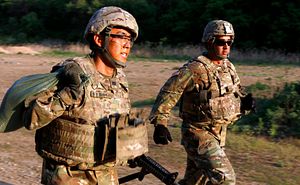Speaking last week in Hawaii, the top military officer in charge of U.S. military forces in South Korea said that recent adjustments to allied exercises had not adversely affected readiness for allied forces.
General Robert Abrams, the commander of U.S. Forces Korea and United Nations Command, said that the militaries of the United States and South Korea had conducted more than 100 exercises, adding that recent modifications to exercises were “prudent action in support of diplomacy.”
Earlier this year, Seoul and Washington announced that the usual springtime Foal Eagle-Key Resolve series of major military exercises would be cancelled and a new allied exercise, named Dong Maeng (Korean for “alliance”) would replace it.
“I want to be crystal clear about it: combined training and readiness haven’t slowed down one bit,” Abrams said. “We are continuing to conduct very rigorous combined training at echelon,” he added.
Abrams was speaking at a the Land Forces Pacific Symposium, hosted by the Association of the U.S. Army in Hawaii.
North Korea, in previous years, has strongly criticized the springtime exercises held by the United States and South Korea, describing the mass mobilization component of the drills in particular as a ruse for an invasion.
Dong Maeng, according to Abrams, involved changes to the size, scope, and type of exercises carried out. The exercises began shortly after the conclusion of the February 27-28 summit in Hanoi, Vietnam, between North Korean leader Kim Jong Un and U.S. President Donald J. Trump.
The Hanoi summit resulted in no agreement between the two sides and, in the ensuing weeks, North Korea has criticized U.S.-South Korea exercises, citing them as evidence of the United States’ “hostile policy” against it. North Korea also argues that these exercises violate both the September 2018 inter-Korean Comprehensive Military Agreement, signed in Pyongyang during the third summit meeting between Kim and South Korean President Moon Jae-in, as well as Trump and Kim’s 2018 joint statement.
“There are now open hostile moves running counter to the June 12 DPRK-U.S. Joint Statement,” Kim said in April, referring to the Singapore Summit declaration agreed between him and Trump at their first summit last summer.
He cited “the resumption of the military exercises whose suspension was directly committed to by the U.S. president” as an example of those “hostile moves,” saying the exercises “rattle” North Korea. Kim promised that Pyongyang would respond with its own “corresponding acts.”
Shortly after those remarks by Kim, on May 4 and May 9, North Korea launched multiple new short-range ballistic missiles — its first missile launches since the November 2017 test-launch of the Hwasong-15 intercontinental-range ballistic missile.
Abrams said the recent North Korean tests did not dramatically alter the situation on the Korean Peninsula. “Recent activities on the peninsula by [North Korea] has not changed the palatable reduction in tension on the peninsula,” he said, “and the door for diplomacy remains open.”

































